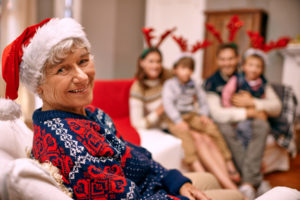December 7, 2018

When dementia care is needed, contact the private home care experts at Continuum.
As soon as the door swings open and your senior loved one wraps you in a warm hug, through the merry holiday dinner and each timeless family tradition, there are numerous ways to not only spend high quality time together, but also to gauge how your senior loved one is truly doing and to notice any red flags that all may not be quite so merry and bright.
In particular, a number of indicators may imply cognitive issues, including Alzheimer’s disease. Because Alzheimer’s has become increasingly common in seniors, and because early detection and treatment are fundamental, the dementia care team at Continuum recommends monitoring for the following typical signs and symptoms of early onset Alzheimer’s disease throughout your holiday visit this season:
1. Social differences. According to John Ramsay, CEO of Shift 8, “Dementia can cause people to become closed-off, avoiding any sense of social interaction.” Focus on any hints both in the senior’s conduct and conversations that point to his or her inclination for reclusiveness and isolation, particularly if the senior has consistently liked socializing.
2. Mood shifts. Depression, anxiety, and apathy are common aspects of early onset dementia. The condition has an effect on a person’s ability to process and overcome emotions, sometimes caused by the inability to recollect what prompted an adverse feeling, leading to increased frustration.
3. Memory loss. Issues with memory are at the core of Alzheimer’s disease, notably, short-term memory. Note whether the senior generally seems to struggle with recent events, but is able to fully engage in conversations regarding long past events.
4. Issues with adjusted routines. Recognizing a sense of disorientation, anxiety or agitation is common during the holiday season, due to its possibility of interruptions to the usual routine. People with Alzheimer’s are more likely to rely on familiarity and could seem out of sorts when deviating from the usual.
5. Physical changes. Notice any decrease in hygiene or in the cleanliness and organization of the house, particularly if the individual has until now been thorough in maintaining a sense of order.
Any worries such as these ought to be brought to the attention of the senior’s primary care physician as quickly as possible.
And, it’s important to have a trusted dementia care partner on hand who understands the nuances of dementia along with other issues of aging, and will offer private home care in St. Louis and surrounding areas, which enables aging parents to remain safe and well. Contact Continuum at (314) 863-9912 or (636) 861-3336 to learn more about our highly-skilled, specialized dementia care team and for a free in-home assessment to learn how we can help.
